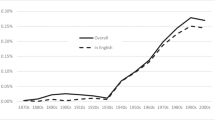Conclusion
The economic system is not divinely ordained. It is the product of human beings and can therefore be questioned and altered if necessary. The Reagan and Bush administrations elevated the status of those extreme right economists who wish to preserve privilege by claiming the divine right of market outcomes. It is the argument of this paper that this divine right has its roots in a Victorian view of natural selection. It is instructive to recognize that this view no longer holds sway in biology. It is even less true in the economic sphere.
Similar content being viewed by others
References
Aoki, M. (1986) “Horizontal Versus Vertical Information Structure of the Firm,”American Economic Review 76, pp. 971–983.
Arthur, Brian (1989) “Competing Technologies, Increasing Returns, and Lock-in by Historical Events,”Economic Journal 99, pp. 971–983.
Asanuma, B. (1985) “The Organization of Parts Purchases in the Japanese Automotive Industry,”Japanese Economic Studies, Summer, pp. 32–53.
Bowles, Samuel; Gordon, David; and Weisskopf, Thomas (1991) “Right-Wing Economics Backfired,”Challenge, January/February.
Clark, Colin (1973) “Profit Maximization and the Extinction of Species,”Journal of Political Economy 81, pp. 950–960.
David, Paul (1985) “Clio and the Economics of QWERTY,”American Economic Review 75, pp. 332–337.
DeBresson, Chris; Sirilli, G. and Luk, F. K. (1989) “Innovation Clusters in Italy, 1981–1985: A Directed Graph Analysis of the Italian Innovation and Input-Output Matrices,” paper presented at the 9th World Conference on Input-Output Techniques, Keszthely, Hungary, September 4–9.
Edersheim, Elinor (1989) “Cooperation, Not Competition, Wins,”New York Times, Sunday, March 26, 1989.
Florida, R and Kenney, M. (1990) “High Technology Restructuring in the United States and Japan,”Environment and Planning A 22, pp. 233–252.
Geroski, P. A. (1989) “Entry, Innovation, and Productivity Growth,”Review of Economics and Statitics 71, pp. 555–564.
Gould, Stephen Jay and Eldredge, Niles (1986) “Punctuated Equilibrium at the Third Stage,”Systematic Zoology 35 (1), pp. 143–148.
Gould, S. J. and Lewontin, R. (1979) “The Spandrels of San Marco and the Panglossian Paradigm: A Critique of the Adaptationist Programme,”Proceedings of the Royal Society of London B, 205, pp. 581–598.
Gowdy, John M. (1990) “Economic Evolution and Selection: Old Controversies and New Approaches,”International Review of Social Economics 14, pp. 32–42.
— (1991a) “Current Controversies in Evolutionary Biology: Lessons for Economists?”Methodus 3, June, pp. 86–90.
— (1991b) “Toward Theory of Non-Marginal Evolutionary Economic Change,”Journal of Interdisciplinary Economics 4, pp. 71–89.
— (1991c) “Bioeconomics and Post Keynesian Economics — A Search for Common Ground,”Ecological Economics 3, pp. 77–87.
— (1991d) “Structural Change in the United States and Japan: An Extended Input-Output Analysis,”Economic Systems Research 3, pp. 413–423.
Gowdy, John M. (1992) “Higher Selection Processes in Evolutionary Economic Change,”Evolutionary Economics (forthcoming).
Mirowski, Phillip (1989)More Heat Than Light, New York, Cambridge University Press.
Mokyr, Joel (1990)The Lever of Riches, New York, Oxford University Press.
Nelson, Richard and Winter, Sidney (1982)An Evolutionary Theory of Economic Change, Cambridge, Mass., Harvard University Press.
Sagoff, Mark (1988)The Economy of the Earth, Cambridge, Cambridge University Press.
Vrba, Elizabeth, and Gould, Stephen Jay (1986) “The Hierarchical Expansion of Sorting and Selection: Sorting and Selection Cannot be Equated,”Paleobiology 12, pp. 217–228.
Weidenbaum, Murray (1983) “Industrial Policy is No Answer,”Challenge, July/August.
Wilbur and Harrison, (1978) “The Methodological Basis of Institutional Economics: Pattern Model, Storytelling, Holism,”Journal of Economic Issues 12, pp. 61–89.
Rights and permissions
About this article
Cite this article
Gowdy, J.M. Economic selection and the role of government: Some lessons from evolutionary biology. FSSE 22, 61–70 (1993). https://doi.org/10.1007/BF02826157
Issue Date:
DOI: https://doi.org/10.1007/BF02826157




